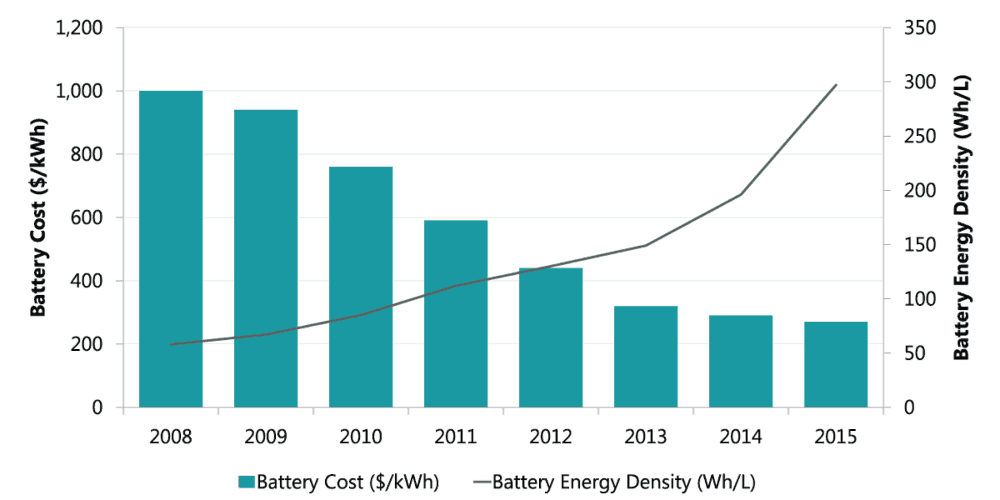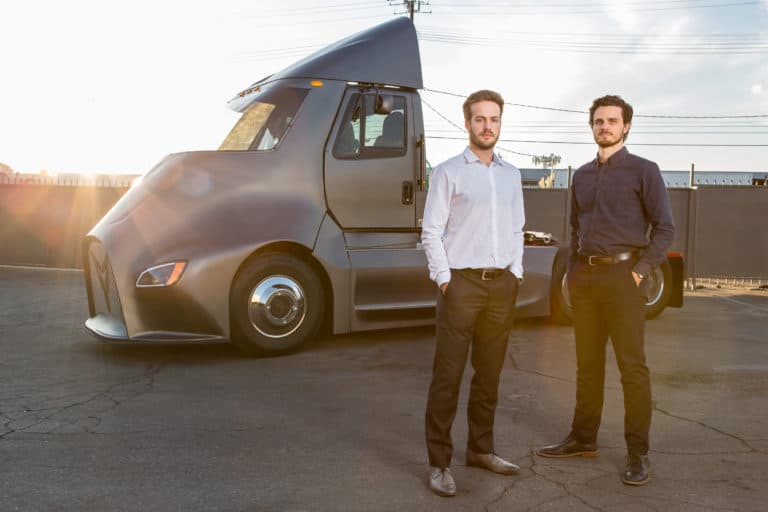
L.A. is a hotbed for EV talent, and electric truck startup, Thor, is ready to take advantage. Last week they announced plans to bring a heavy-duty electric vehicle to market before the Tesla Semi hits in 2019.
COO Giordano Sordoni, who suffered from terrible asthma due to a pollution-riddled Los Angeles, and his partner, CEO Dakota Semler, were motivated to start a project that would have a social impact, an environmental impact, and could be a sustainable business. An electric truck startup seemed like a perfect fit.
Thor Trucks’ prototype, the ET-One, has been referred to as “Frankenstein.” Part of the business strategy is to cobble it together from other tractor-trailers. That description isn’t especially apt when one sees the stylish hulk.
The strategy also happens to be a compelling approach: use established trucking components suppliers to scale, providing confidence for customers. Large fleets won’t want to hear that 90 percent of parts were developed in a company’s first year of existence.
The chassis comes from a Navistar commercial truck. It uses heavy-duty Dana axles and an off-the-shelf motor from supplier TM4. Starting off modestly, they decided to build their own battery modules from cells and packs purchased from a vendor.
The ET-One has a range of 300 miles, a full load capacity of 80,000 pounds, and will retail for $250,000. The 100-mile-range version will start at $150,000. Advantage Tesla, that also starts at $150,000, but for a truck with an estimated 300-mile driving range, and at $180,000 for a truck with an estimated 500-mile range.
The ET-One was designed with the fleet-operator and truck driver in mind. Design choices were influenced by managers and drivers of fleets ranging 10 to 10,000 vehicles in size. Thor is doing everything it can to understand the concerns of its customer and design a vehicle that integrates seamlessly with an existing fleet.

While diesel commercial vehicles make up about 7% of vehicle on our roads, they account for almost 18% of on-road emissions. Many regional and local commercial vehicles bring these emissions to straight to the communities where we live, work, and send our kids to school. Thor thinks it’s time for a shift.
Speaking at the MilkenInstitute last month, 25-year-old CEO, Dakota Semler, has been thinking about green transportation since he converted his mother’s SUV to run on vegetable oil as a teenager. Semler’s multi-generational family of fleet operators owned a fleet of 150 trucks based out of Riverside, California, and ran diesel trucks. “We’re part of the problem,” he says.
“Everything is focused on Return on Investment for fleet operators, a customer-driven operation cycle. There’s a huge surge in logistics technology right now, but trucks are still left behind.”
He sees a niche for Thor, however modest at first. “The global truck market is a 410 billion dollar market. Class 7 and 8, the heaviest of the trucks, there’s a 40 billion dollar market. There’s a 13 billion dollar market for regional and medium-haul trucks.”
Electrification leads to massive changes in a fleet’s cost structure by saving fleets money on fuel, maintenance, and compliance. Thor started by helping fleets go electric to help them stay competitive in the world of “on-demand free shipping.”
Thor’s battery pack is designed specifically for commercial heavy-duty applications. The battery pack is comprised of the highest energy density lithium-ion cylindrical cells available. Thor is looking forward to new battery technologies that have potential to allow for rapid charging or longer ranges. They are ready to adapt to new technologies as they are commercially viable.
How many vehicles will actually come out in 2019? How powerful is the engine? These questions remain a mystery. While Thor’s name is bold, and so is their announcement that they may beat Tesla to market, they’re small (only 18 employees), and are not about the hype. There’s a lot of “smoke and mirrors” in the industry right now. Thor is pushing to enter the market for regional and medium-hauls, and they’re more about managing expectations, and taking the long view.
Stay up-to-date with the latest commentary and insights on FreightTech and the impact to the markets by subscribing.











